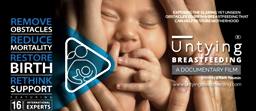|
|
||
|
Pro Tools
FILMFESTIVALS | 24/7 world wide coverageWelcome ! Enjoy the best of both worlds: Film & Festival News, exploring the best of the film festivals community. Launched in 1995, relentlessly connecting films to festivals, documenting and promoting festivals worldwide. Working on an upgrade soon. For collaboration, editorial contributions, or publicity, please send us an email here. User login |
Untying Breastfeeding: Tongue-tied babies? Here comes the solution
Untying Breastfeeding: Tongue-tied babies? Here comes the solution Just as giving birth, pregnancy and menstruation are phenomena that no man can ever experience, so also is breast-feeding. But what appears to be the easiest among the womanly gifts and acts, breast-feeding can be an ordeal, even traumatic, and can drive some women to the brink of suicide. It does sound alarmist and preposterous, but there is reason enough to belief that it is not as easy or natural as it might seem. Untying Breastfeeding is a 59-minute documentary by Effath Yasmin about the factors that could make breast-feeding very, very difficult and almost impossible. It focuses on a condition called tongue-tie, wherein the lower part of a baby’s tongue is joined to the floor of the mouth and, as a result, it hurts both the mother and the baby when attempts are made to breast-feed. In extreme cases, it becomes a cause of deep anxiety, when the mother is unable to feed her baby. The condition affects 3-20% babies in the countries surveyed (India has the lower rate); however, statistics are not exhaustive and, at least as far as India is concerned, the data is dated. In other words, the problem may be much more severe than it appears. Doctors do not recognise tongue-tie or lip ties in general and their impact on feeding. But there is hope.
Effath Yasmin is a Mumbai-based leading Consultant--Lactation and Craniosacral Biodynamics, who has taken pains to study the phenomenon and found that a very minor cut, performed with a pair of scissors or laser, can produce 80% results within 48 hours and 100% in a few days. It is best performed when the baby is two to six weeks old. In the film, as many as 17 international medical experts, both men and women, including Effath Yasmin, have detailed how the issue remains unexplored in most countries, and that long-term damage can be caused by neglect. When a baby sucks its mother’s breast, dozens of muscles and bones are involved, and if there is no breast-feeding, their under-development can cause other problems, like breathing issues, sleep apnea. speech disorders, anxiety and depression. Hardly anybody, including most gynæcologists, pædiatricians, oral surgeons and dentists, are aware of the tongue-tied condition, though they are fully aware of lip-tied babies. It requires careful examination. Four categories of tongue-tied babies have been classified, depending on the position of the join—beginning with Class I, if it is right in front and Class IV, when it is way back. No routine check is performed to see if the new-born baby has this condition, and mother and child might be discharged without it being diagnosed. Incidentally, Brazil has taken the lead in the matter, and as the Brazilian expert says on camera, it is now mandatory under law to check whether a new-born baby has a tongue-tied before discharging the mother and baby from the hospital. Besides experts, Yasmin has on screen, some mothers, who have benefitted from proper diagnosis and corrective surgery. They describe, in heart-rending detail, what trauma they went through till help was underway. One woman said she felt impotent at being unable to feed her baby, another felt it was sandpaper rubbing against her breast and not a tongue, another one was tearing her hair and turning suicidal. That such women and babies found succor goes to the credit of Yasmin and her fellow practitioners. Two of the women who found an angel in the shape of Yasmin were present at the screening at the National Centre for the Performing Arts’ Little Theatre on Saturday evening, and showed great bravery when they came up on stage to share their experiences first-hand. Understandably, they were choking with emotion and tears flowed freely. After all, they might have never discovered one of the greatest joys of motherhood, breast-feeding, had it not been for Yasmin. Yasmin herself was unable to control her feelings, and members of her film unit who came on stage were equally moved. Combine the disability of being tongue-tied with the abundance of formula supplements, and the problem becomes more acute. No artificially prepared formula or baby food can really, fully, replace mother’s milk. So, if you are unaware of the tongue-tied condition of your baby, you might be taken-in by the advertising and marketing gimmicks of baby food manufacturers, who have been in the market for nearly 70 years, that the formula feed is the easy and only way out. The joy that a mother feels when she holds her baby to her skin and breast feeds it cannot be defined or measured. Untying Breastfeeding also touches upon induced labour and how that impacts hormonal secretions. As in the case of breast-feeding, Yasmin makes a case for natural childbirth. A panel of experts was present on stage after the screening and they detailed how the body prepares itself for labour, even though there is pain involved. We must learn from animals, they opined, who take giving birth/littering as a matter of routine. One case was cited where in south India, a man went to summon a doctor and a nurse when his wife began to enter labour. The doctor lived far away and a boat ride was required. It took the husband six hours to return. What they found was amazing: the wife had given birth, she had cleaned the place and she prepared tea for her guests. And where did she lean about what to do? From the animals on her farm. Editing is crisp and shots fade out just as the last words are spoken. Almost every cut is a fade-out, which does get predictable after a while. Stock shots are used for transitions in three or four places. Wild animals are seen, as are sunrises. In one shot, we are shown just the feet of a baby toddler walking on grass. That itself is an emotional sight, but it would have been even more impactful had they opted for the delightful gurgle of a smiling baby. Animation is well-used to show the tongue-tied condition and its treatment through minor surgery. Though it not great cinema, the film is topical and relevant. It opens our eyes to a phenomenon that is not really a disease and does not need pathological tests to be identified. A minute examination and one little cut can mean so much to so many unfortunate mothers and their babies. In that context, it is not a specialised film for the medical fraternity only; rather, it is for general audiences across all classes, and couples in particular, expectant couples and couples with young babies. The sooner the condition is rectified, the better will it augur--for the mother, the child, the father and their family. Untying breastfeeding has already been shown at Gold Coast (Australia), Toronto (Canada), Delhi, Bengaluru and Mumbai (India). It is soon to be screened in 96 cities around the world in the flowing countries/regions: Canada, US, South America, Europe, UK, Middle East, Australia, Indonesia, New Zealand and Tasmania. 16.09.2018 | Siraj Syed's blog Cat. : Effath Yasmin Independent FILM
|
LinksThe Bulletin Board > The Bulletin Board Blog Following News Interview with EFM (Berlin) Director
Interview with IFTA Chairman (AFM)
Interview with Cannes Marche du Film Director
Filmfestivals.com dailies live coverage from > Live from India
Useful links for the indies: > Big files transfer
+ SUBSCRIBE to the weekly Newsletter Deals+ Special offers and discounts from filmfestivals.com Selected fun offers
> Bonus Casino
User imagesAbout Siraj Syed Syed Siraj Syed Siraj (Siraj Associates) Siraj Syed is a film-critic since 1970 and a Former President of the Freelance Film Journalists' Combine of India.He is the India Correspondent of FilmFestivals.com and a member of FIPRESCI, the international Federation of Film Critics, Munich, GermanySiraj Syed has contributed over 1,015 articles on cinema, international film festivals, conventions, exhibitions, etc., most recently, at IFFI (Goa), MIFF (Mumbai), MFF/MAMI (Mumbai) and CommunicAsia (Singapore). He often edits film festival daily bulletins.He is also an actor and a dubbing artiste. Further, he has been teaching media, acting and dubbing at over 30 institutes in India and Singapore, since 1984.View my profile Send me a message The EditorUser contributions |





























